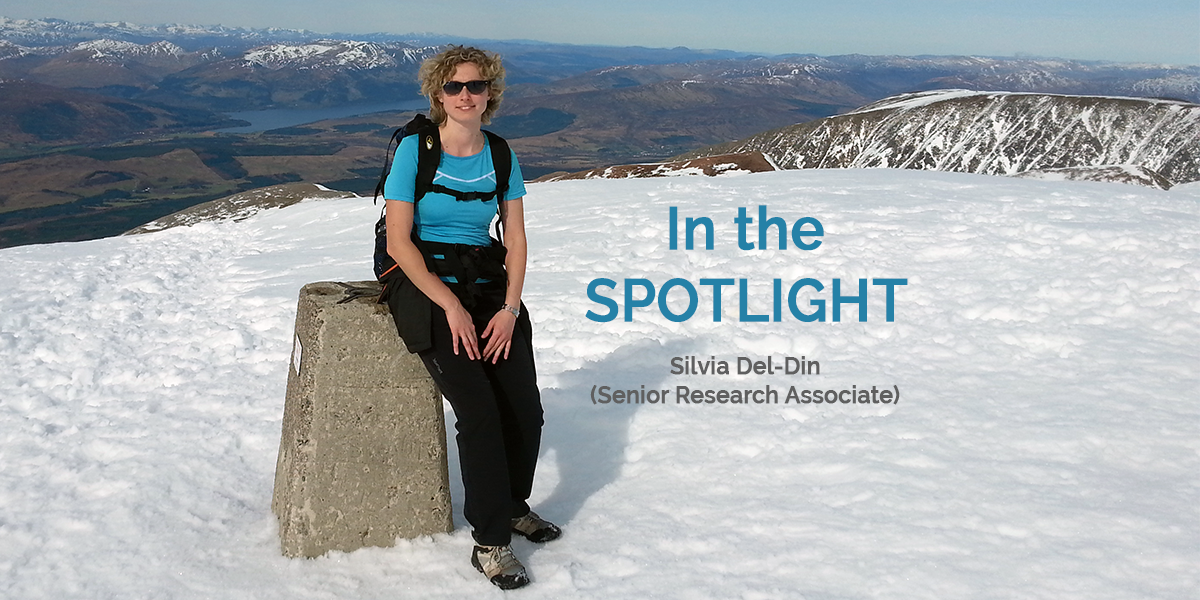Our Mobilise-D colleague Dr. Silvia Del-Din has always been fascinated by research and the idea of “making a difference in people’s lives”. Here she explains her role in Mobilise-D, her new NUAcT fellowship at Newcastle University, and her perspective on how remote monitoring can revolutionize healthcare.
Silvia (37) was born in Agordo in the North-East of Italy and is a great fan of travelling and hiking. In her professional life, she has been involved in research for more than 10 years now. But how did a young girl from a small town nestled in the Dolomites, end up doing research? “Almost by chance! After completing my master in Bioengineering in Padua, my supervisor asked me if I wanted to stay for a PhD, so I decided to give it a go, I applied and… here I am: still in research after quite a few years!”, says Silvia.
During her PhD at the University of Padua, she had the opportunity to spend one year in Boston at Harvard University working with Prof. Paolo Bonato at the Spaulding Rehabilitation Hospital. In this hospital, she started working with wearable technology on stroke survivors and upper limb function. This laid the foundation for her future research interests.
After completing her PhD she moved to Newcastle where she has lived for almost 10 years now, initially working as a Research Associate and then as a Senior Research Associate in the Brain and Movement Research Group, Newcastle University upon Tyne. In April 2019 she became part of the Mobilise-D Consortium team where she now leads the tasks related to the selection and validation of algorithms for digital mobility outcomes quantification in the so called “pre-technical” (existing datasets) and technical (technical validation study data) phases. “My expertise and research interests focus on digital health. In particular, I am interested in using wearable technology
“My expertise and research interests focus on digital health. In particular, I am interested in using wearable technology
and in developing analytics for remote monitoring and quantification of digital mobility outcomes in ageing and neurodegenerative diseases (e.g. Parkinson’s disease, dementia).”
Silvia was awarded the highly competitive Newcastle University Academic Track (NUAcT) Fellowship. The NUAcT is a scheme that offers the time and freedom for early career researchers to turn their ideas into a research programme that will propel them into a successful academic career. When she applied, the Newcastle University received approximately 700 applications, only 18 of which were awarded a NUAcT Fellowship.
“It has been a bit of a journey as I applied at the beginning of 2020, then COVID-19 happened and so the scheme was put on hold, it then resumed at the beginning of 2021. I was shortlisted for interview, I got my NUAcT offer in March and I am officially starting in July”, says Silvia, who is excited to start this next adventure in the academic world. Fortunately, she will not abandon Mobilise-D but continue her work in the technical validation tasks.
Silvia’s proposed translational research programme and vision aims at translating digital healthcare to enable remote patient management.
“I want to innovate and transform healthcare, improve patients’ quality of life by enabling remote monitoring through real time analytics for feedback generation. My NUAcT fellowship aims to provide a proof-of-concept of this vision in Parkinson’s disease by modelling and predicting the impact, onset and duration of medication effects on motor performance, in patient’s everyday life. This could revolutionize at-home patient care by helping to refine targeted therapeutic strategies (e.g. optimising timing and dosage of medication intake).”
But a research life is not only about aims and performance, it is also about meeting people, exchanging research ideas and being in an international environment. Silvia gets a lot of exposure and she told us that “at first, when I meet new people, a lot of time they think I am Scandinavian because of my fair skin and blonde hair… of course they soon change their mind as soon as they hear my “Itanglish” accent!” Nevertheless, she has a Scandinavian and “mobiliser” spirit to keep a healthy and active life.
Working as a researcher means a lot of time spent in front of a computer, and that’s not optimal when you want to keep Mobilise-D. That means that spare time has to be filled with physical activities: “I tend to either walk at a very good pace (either to work or just in the park) or run every day. I also used to go to spinning classes at the gym… I think now it’s time to go back to that too!”
We congratulate Silvia with her fellowship and wish her the best of luck in achieving her goals – both academic and personal!
Remember to FOLLOW us on Facebook, Twitter and LinkedIn.
Subscribe to our Newsletter.






